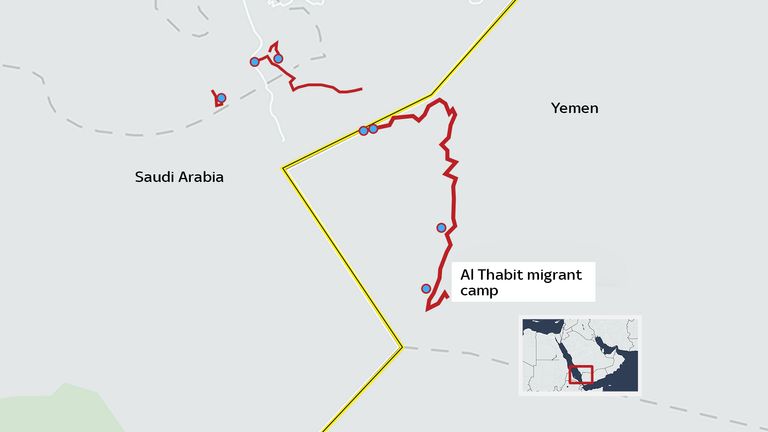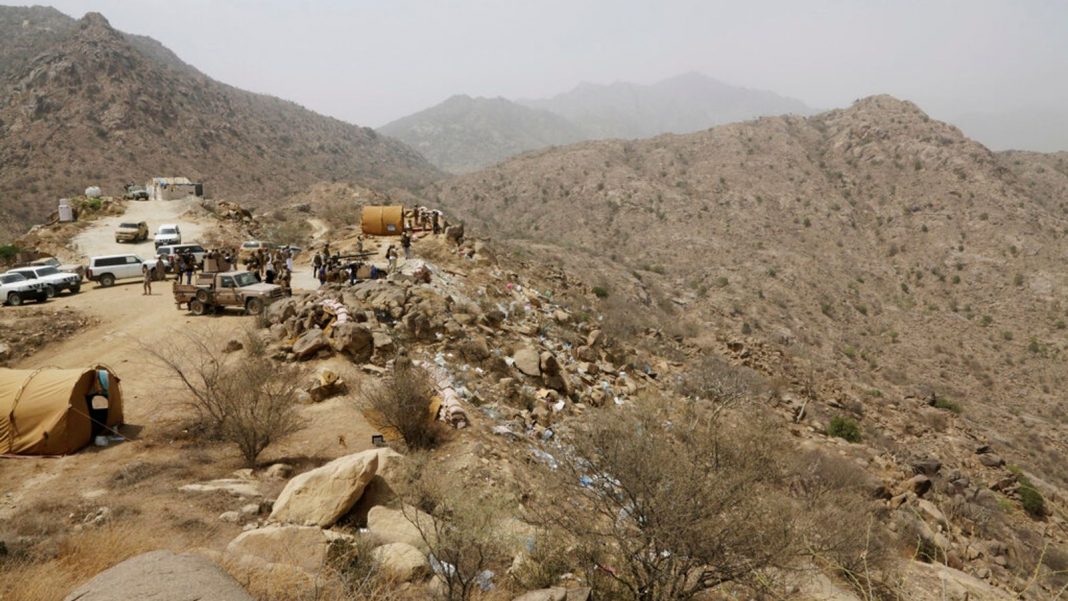Saudi Arabian border guards launched mortars and fired machine guns at Ethiopians trying to cross into the country from Yemen and likely killed hundreds of unarmed migrants in recent years, a new report has claimed.
Human Rights Watch said eyewitness reports and pictures mention and show dead bodies and burial sites along routes used by migrants, adding the number of those who have died could even be in the “thousands”.
Sky News has been told by sources there is an ongoing investigation in Saudi Arabia about these allegations and they’re being taken “very seriously”.
The group spoke to 38 migrants from Ethiopia, and the relatives of people who attempted the border crossing between March 2022 and June 2023, who said they saw Saudi Arabian guards shoot at migrants or launch explosives at them.
It went through 350 videos and photographs on social media and elsewhere from between May 2021 and July 2023, as well as analysing hundreds of square miles of satellite images from February 2022 and July 2023.
“These show dead and wounded migrants on the trails, in camps and in medical facilities, how burial sites near the migrant camps grew in size, the expanding Saudi Arabian border security infrastructure, and the routes currently used by the migrants to attempt border crossings,” the report said.
Aerial photography analysed by the Associated Press news agency shows tent structures identified by Human Rights Watch close to al Raqw in Yemen, close to the Saudi border, with two sets of fence lines.
Human Rights Watch also identified the al Thabit migrant camp in satellite images, with pictures supporting the narrative it had been largely taken down.
Both areas are in Houthi-controlled regions, which the UN says “collaborates with traffickers to systematically direct migrants”.
Saudi Arabian forces have been battling Houthi rebels since 2015 in an effort to remove them from power in Sana’a, but to little avail.
Human Rights Watch also used the images, as well as geolocated video, to identify the migrant routes and border guard points.
Nadia Hardman, a refugee and migrant rights researcher at Human Rights Watch, told Sky News: “We’re talking about widespread and systematic attacks – Saudi border guards are using explosive weapons and shooting Ethiopian migrants at close range.”
She called for an immediate end to these mass killings – and said she hopes a UN-backed investigation will be established to determine whether the killings are a crime against humanity.
Read more:
Saudi delegation to negotiate permanent ceasefire with Houthi rebels
UK foreign aid cuts could lead to thousands of deaths, report warns
Please use Chrome browser for a more accessible video player
2:58
What’s happening in Yemen?
‘They fired on us like rain’
Ethiopians using migration routes have often come from the country via the Horn of Africa, across the sea, and then into Saudi Arabia via Yemen.
Migrants have typically found themselves detained, abused and killed, Human Rights Watch said, with the United Nations expressing concern about the treatment of those crossing via Yemen by Saudi forces.
Someone who spoke to the group for the report said: “There were 20 in our group and only 10 survived.
“Some of the mortars hit the rocks and then the [fragments of the] rock hit us… The weapon looks like a rocket launcher, it had six ‘mouths,’ six holes from where they fire, and it was fired from the back of a vehicle – it fires several at the same time. They fired on us like rain.”
A 14-year-old said: “We were fired on repeatedly. I saw people killed in a way I have never imagined. I saw 30 killed people on the spot.
“I pushed myself under a rock and slept there. I could feel people sleeping around me. I realized what I thought were people sleeping around me were actually dead bodies. I woke up and I was alone.”

The border between Yemen and Saudi Arabia

The route taken by migrants into Saudi Arabia from the al-Thabit camp, according to Human Rights Watch
Yemen’s Houthi rebels, who are thought to earn thousands of dollars a week smuggling migrants over the border, did not respond to requests for comment from the Associated Press.
Around 750,000 Ethiopians live in Saudi Arabia, and it is thought up to 450,000 entered the country without permission, according to the International Organization for Migration.
The ongoing civil war in Ethiopia’s Tigray region has displaced tens of thousands of people, and while Saudi Arabia is said to be struggling to fill vacancies, the Kingdom has been sending migrants back to their home country, working with the government of the African country.







